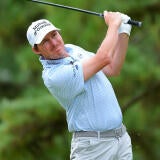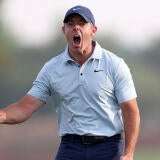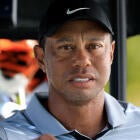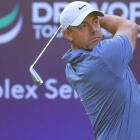United States golf remains disjointed as quarter century of European Ryder Cup dominance continues unabated
Europe has won nine of the last 12 Ryder Cups, and it's not tough to understand why
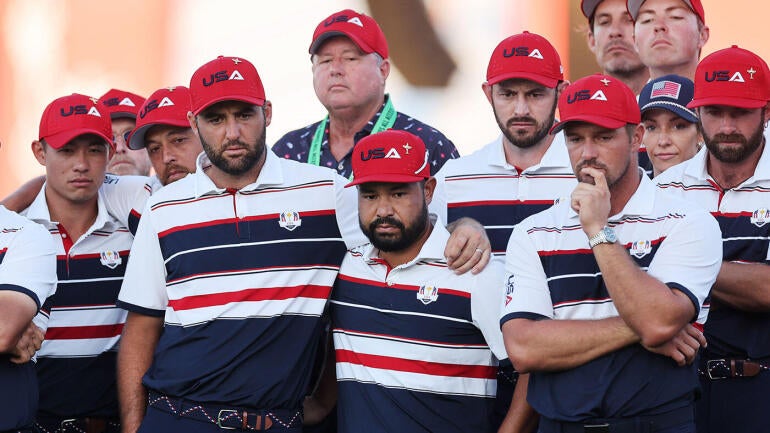
FARMINGDALE, N.Y. -- The Ryder Cup's greatest appeal isn't the United States competing against Europe, the wild crowds, the biennial cadence of the event or the world-famous golf tracks that host it.
The reason it stands out from the major championships, the PGA Tour schedule and Olympics is because golf, an individual sport -- perhaps the most individual sport of them all -- undergoes a paradigm shift into a team game under the Ryder Cup banner.
Once every two years, for three days, the rules change. The game transcends itself, requiring the collective skill and will of 12 men, not one, to enter the winner's circle.
You've heard it all before, but as the cheers of European supporters rang out across Long Island, long into Sunday night, there is no more poignant time to reiterate the lesson learned from the inherent nature of this event.
Europe beat the United States 15 to 13 because it played sizzling golf, collectively, as a team.
The U.S. may have most of the best golfers on the planet, but once again, it did not have the best team.
And so, for the ninth time in the 12 renditions of this illustrious golf celebration since the turn of the century, Europe again proved to be better.
The only feather in the United States' cap was that it prevented this Ryder Cup from becoming a runaway, legendary blowout.
At least there was some fight. It took until Sunday -- the fifth session and final 12 matches -- for the Ryder Cup to get interesting, for the Americans to look like they actually wanted to win the damn thing.
Thriving across 11 one-on-one matches, the U.S. unintentionally proved the point its team has been forced to relearn every two years: The Ryder Cup is about the collective, not the individual.
The Americans ultimately scored a Sunday singles record-tying 8.5 points, going 6-1-5 head-to-head on the final day of competition. The 12th match was "enveloped" after Europe's Viktor Hovland pulled out with a neck injury, inducing the U.S. to reveal Harris English would sit as well. Each side conceded a half point, pushing Europe ahead 12 to 5 before the first match of the day teed off.
(As an aside: United States captain Keegan Bradley, who was none too pleased that his team lost an opportunity to score a full point, is correct: "The rule has to change," he said Sunday night. "It's obvious to everybody in the sports world, in this room, that rule needs to change by the next Ryder Cup.")
What ensued over the five hours of singles competition alternated between being intriguing, thrilling and ... briefly ... hope-filled. Xander Schauffle emphatically took down Jon Rahm. Scottie Scheffler finally got off the schnide by narrowly topping Rory McIlroy. (Scheffler entered Sunday as the first world No. 1 to ever start 0-4-0 in a Ryder Cup). Bryson DeChambeau tied a record, rallying from five down through seven holes square his match with Matt Fitzpatrick.
Match by match, the scoreboard flipped from gray to red. The seven-point margin before the opening tee suddenly dropped to three when J.J. Spaun soared over Sepp Straka.
It was a comeback that fueled -- for just for a moment -- fleeting hope amongst the tens of thousands of U.S. fans flooding the grounds around the final four holes.
That hope vanished at 5:15 p.m. ET when Shane Lowry sunk a 6-foot, 3-inch putt to lift Europe to 14 points, clinching a Ryder Cup retention and putting the visitors a half point away from an outright win.
Moments before that, just when it seemed as if the United States was threading the smallest needle in golf history, Russell Henley had the shot of his life: 128 yards out of the left fairway bunker, a blast easily at least 100 feet in the air that plopped down less than 10 feet from the pin. But Henley left his putt short, which cracked the door for Lowry, who drained his effort and exploded with glee.
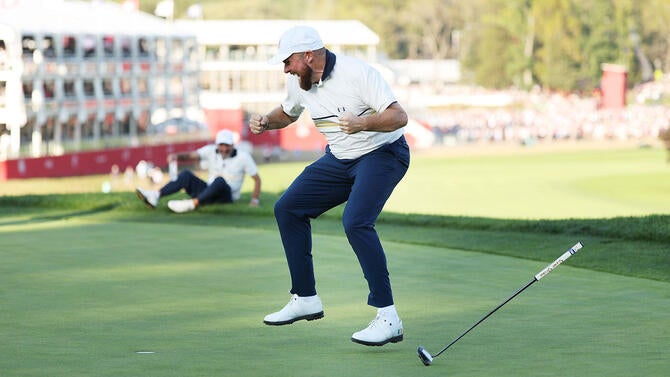
The Irishman was brought to tears. It took a team effort, but the big man finished the job. Lowry didn't even win his match; in fact, the only European to claim a full point Sunday was Ludvig Åberg, who defeated Patrick Cantlay.
Sunday was the coronation. Europe did its work Friday and Saturday. It won three of the first four sessions 3 to 1 (the other 2.5 to 1.5), becoming the first visiting team to sweep foursomes and fourballs in modern Ryder Cup history. That left almost no chance for the U.S.
Europe's putting was unreal. The greens were too forgiving, to be sure, and the Bethpage Black rough was far from its typical depth and hellish coarseness. Those were the cardinal sins of Bradley's American captaincy. Europe never let the United States believe it had a chance in the team competition. That psychological edge so often seen in traditional team sports proving critical Sunday when the United States finally got its act together.
"This is no one's fault but mine," Bradley said. "When you're the leader of the team, the coach, whatever you want to call it ... when you lose, you take the blame."
There are significant questions for the United States to address: how it picks its captain, how its captain handles foursomes and fourballs, how to use modern data to make more informed decisions.
If the Ryder Cup is going to return to being an actual rivalry again, at the core of it all needs to be something of a reckoning with not only how the United States builds its team, but also the psychological approach it takes in the weeks and months leading up to the Ryder Cup.
The Americans' next chance comes in 2027 at Adare Manor in County Limerick, Ireland. The U.S. will enter as an even bigger enemy than Europe appeared to be in New York over the past three days.
That underdog status can only be contested through chemistry and genuine belief in one another.
Genuine teamwork is the essence of the Ryder Cup. It is a requirement. The European side understands this on a fundamental level. It's why those in blue and yellow are taking the trophy back across the Atlantic Ocean, while the United States is left watching the other side celebrate, trying to remember what that feeling is all about.



